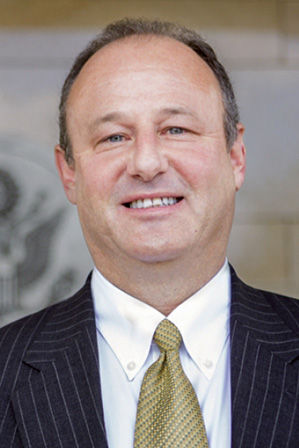Cold War Lessons
President’s Views
BY ERIC RUBIN

This month’s FSJ includes a series of remembrances by Foreign Service colleagues who participated in U.S. exhibit programs reaching out to the peoples of the Soviet Union and the Soviet bloc during the height of the Cold War.
The stories they tell are inspiring. They remind us that even at the height of the conflict between the two superpowers, the U.S. worked hard to engage with the peoples of the communist world through exchanges, public diplomacy, and personal engagement.
Today, as we navigate a dangerous and worrisome period of renewed conflict in Europe, sparked by the Russian Federation’s return to imperialism and rejection of the central principles of the post–World War II and post–Cold War settlements, as well as its flagrant violations of the United Nations Charter and international law, it is worth looking back on those efforts.
It is sad and painful to acknowledge that our relations with today’s Russia are far worse than they were with the USSR at the height of the Cold War. And while it is hard to conceive of a return to normal people-to-people outreach and step-by-step diplomacy at a time when Russia has invaded Ukraine and violated every principle of the international system, we can learn much from the stories told in this edition of the Journal.
Diplomacy matters. Even when we were waging a proxy war against the USSR in Southeast Asia, Africa, and much of the rest of the developing world, we prioritized progress on arms control, exchanges, and other people-to-people diplomacy. When our relations hit rock bottom after the Soviet invasion of Afghanistan in 1979, we continued to push for contact with the peoples of the Soviet Union and worked to reduce the threat of nuclear war.
The results were significant, including major arms control treaties that reduced the danger of nuclear conflict, and the Helsinki Final Act that committed the USSR to respect basic human rights principles including freedom of travel and emigration.
These major steps forward made the world safer and set the stage for changes in the communist bloc that culminated in the end of the Cold War and Soviet rule in 1991.
People-to-people contacts matter. Any study of the decline and fall of Soviet power must take into account the role of our efforts to reach out to the peoples of the Soviet bloc, starting in the 1950s and continuing through the 1960s, 1970s, and 1980s. Soviet dissidents have spoken at length about the importance of support from the West, and the U.S. in particular, in encouraging them to believe in a freer and better future.
Our exchange programs, cultural programs, and ongoing outreach mattered enormously, as confirmed by the first-person accounts in this edition of the Journal.
We can agree to disagree. Throughout the Cold War, we never refused to engage with citizens of the communist bloc, despite serious and fundamental disagreements with their governments. We understood that building people-to-people contacts could overcome the differences between our society and those of the Soviet-dominated world.
We also can reach agreements with governments we abhor. At the height of the Cold War, we negotiated the Helsinki Final Act and a host of arms control agreements with the Soviet Union. None of those agreements signified U.S. acceptance of Soviet communism. To the contrary: We used these agreements to push back against totalitarian tyranny and found significant success. And yet …
Values matter. The U.S. made mistakes during the Cold War in supporting dictatorial regimes that supported us against the Soviet Union and the spread of communism. We need to learn from the lessons of that time.
We can best advance our country’s security and prosperity by working with and supporting governments that share our fundamental values, while still engaging with those that do not.
Don’t give up. The world is a mess, and it is not wrong to be concerned about how things are going across the globe. We need to hold firm to our fundamental values and interests and insist that free people will, in the end, make the right choices if they are allowed to do so.
When sharing or linking to FSJ articles online, which we welcome and encourage, please be sure to cite the magazine (The Foreign Service Journal) and the month and year of publication. Please check the permissions page for further details.

